
 |


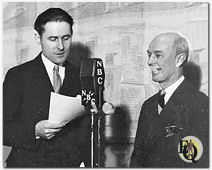 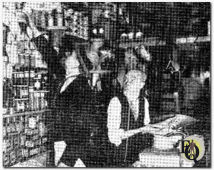 Above left: Parker Fennelly and Arthur Allen as The Stebbins Boys in the radio studio. Above right: Parker Fennelly and Arthur Allen enacting their roles as The Stebbins Boys John and Esley in their general store. |
|
Arthur's wife, Gertrude Elizabeth Watt Allen passed away suddenly, at the Nassau Hospital, Hempstead August 19, 1931 following an operation for appendicitis. She was buried in Gowanda, NY.
In 1932 a Hat Company wanted Allen's photo for as an
advertisement of the proper way a well dressed young man should look in a
hat ad, in the ad he looked about 30. The Western Clock Company contracted the popular team of Arthur Allen and Parker Fennelly for an air series starting Sunday September 16. 1934. The weekly 15-minute broadcasts intended to take the place of Dream Drama (NBC, Sep 16. 1934 - aft. Jun 1935?) presented by this sponsor in former years in stead it continued under the same name. Soconyland moved to CBS on October 16. 1934 and was retitled Snow Village Sketches. It continued on CBS until May 21. 1935. Went to NBC for four episodes in 1937, 1938 and 1942 and 1943 and ended at Mutual with a series of at least 11 episodes between December 28. 1945 and May 5. 1946. The Simpson Boys of Sprucehead Bay (Blue-NBC, 1935 -1936) Arthur Allen and Parker Fennelly, hardly re-invented their act as the Simpson Boys, country storekeepers "way down East" (pictures below). |
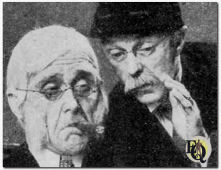 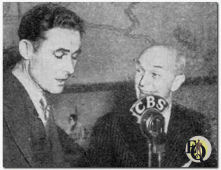 Above left: The Simpson Boys of Sprucehead Bay (Blue, 1935 - 1936) Arthur Allen and Parker Fennelly, hardly re-invented their act as the Simpson Boys, country storekeepers "way down East". Above right: The Simpson Boys of Sprucehead Bay (Blue, 1935 - 1936) Arthur Allen and Parker Fennelly, as they really look. |
|
In 1936 Arthur was seen again on the Broadway stage first as the country storekeeper in George Ade's comedy The County Chairman (National Theatre, May 25. - Jun 1 .1936), a role they repeated in August when both Parker Fennelly (Unckle Eck) and Arthur Allen (Vance Jimmison) were part of the Mohawk Drama Festival presentation of that same play. The following year he was "Fortune Friendly" in the play The Farmer Takes a Wife.
In February 1937 it was reported that Arthur was limiting
his work to the one Saturday spot. "I want to enjoy life," was his
explanation. "I have taken to heart the title of the show, 'You Can't
Take It With You." On the big screen he made very few appearances, he was seen in Ebb Tide (Paramount, Nov 17. 1937) which was directed by James P. Hogan "famed" for his Ellery Queen series. Fennelly and Allen tried to get a Snow Village revival going in 1938 whilst on Broadway Arthur created one of the leading roles Professor Willard in Our Town (Henry Miller's Theatre - Morosco Theatre, Feb 4. - Nov 19. 1938). Parker and Fennelly did play in Four Corners U.S.A. (1938-1939) as Eben and Jonah Crowell respectively. The Radio Guild had been around for 10 years when in 1939 Merritt P. Allen wrote comedy scripts about those genial old Vermonters, Noah (Parker Fennelly) and Mary Perkins (Effie Palmer) his wife and Toby Waller (Arthur Allen), their grumbling friend. |
|
|
In radio's Your Family and Mine
(1938 - 1940) the role
of Lem Stacey was portrayed by Parker Fennelly whenever the part is in the
script. A short while back Lem was played by Arthur Allen
(1939). By 1940 Arthur, a garden fanatic, still lived in his Long Island place, which was antique laden. One newspaper added that Arthur even had a collection of 145 flatiron holders. |
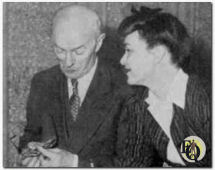 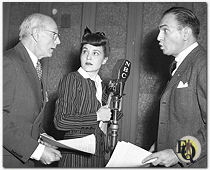 Above left: Arthur Allen (Doc Prouty) polishes his glasses to better see Marion Shockley (Nikki Porter). Above right: (From L to R) Arthur Allen, Marion Shockley and Santos Ortega in The Adventures of Ellery Queen (CBS, 1940). |
|
When the first CBS radio season of The Adventures of Ellery Queen went from one hour to half an hour Allen took over from Robert A. Strauss as Doc Prouty. Arthur started the role February 25. 1940 and it ended April 21. 1940. Doc Prouty wasn't included in any other episodes. (pictures above). Although a review for episode 68 "The Song of Death" in January 1942 mentions "newcomer" Arthur Allen in the role of the medical examiner. In 1940 Arthur Allen was seen in two more movies both directed by Sam Wood: maybe his best movie role in a reprise of his Broadway role of Geology Professor Willard in Our Town (United Artists, May 9. 1940) (below left) and the Western Rangers of Fortune (Paramount, Sep 19. 1940) where he played Mr. Prout, a persecuted newspaper publisher who chimes in with some erudite sleuthing (below right). On stage he played Horatio Drum in Horse Fever (Mansfield Theatre, Nov 23. - Dec 14. 1940). |
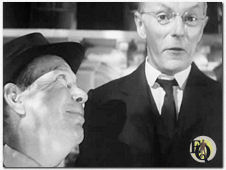 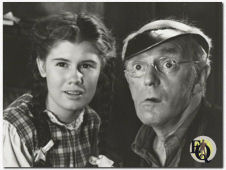 Above left: Frank Craven and Arthur B. Allen in Our Town (United Artists, May 9. 1940). Above right: Sam Wood's Rangers of Fortune (Paramount, Sep 19. 1940) with Betty Brewer and Arthur Allen. |
|
Arthur was also heard weekdays on Mother O' Mine (Blue, 1940 - 1941) a soap with Agnes Young (Mother Morrison), Donald Cook (John) and Jackie Kelk (Pete). For the series Gibbs and Finney, General Delivery (NBC Blue, Jul 26. - Oct 18. 1942) Raymond Knight wrote a warm, dramatic serial in which Fennelly and Allen played their familiar roles as owners of their town's general store, Gideon Gibbs and Asa Finney. Actress Patsy Campbell was also cast in this Sunday evening serial. In 1944 he played a Broadway revival of Our Town (City Center, Jan 10. - 29. 1944) where he reprised his earlier role he had on stage and in the movie. Described as brilliantly amusing in a brief appearance as an earnest diffident professor. That year Arthur had his first heart attack. He didn't return to the stage. They persisted under the banner Soconyland Sketches (as of Dec 1942 known as Snow Village) for other firms at intervals to 1946. The duo had turned their characterizations inspired by those in the Socony show into careers, appearing in different, similar incarnations through the years: The Stebbins Boys (of Bucksport Point) (1931 - 1932), Day Dramas (1934 - 1935), The Simpson Boys of Sprucehead Bay (Blue, 1935 - 1936) , Four Corners U.S.A. (CBS 1938 - 1939) and Gibbs and Finney General Delivery (1942). ... It was a role Fennelly would play over and over. He later gained national fame on Fred Allen's radio program Allen's Alley in the mid-1940s, portraying Titus Moody, another version of the stock New England character.
He was stricken with a heart attack on August 18. prior to
his appearance on the Lorenzo Jones radio program and was taken to the
hospital. Arthur B. Allen died on August 25. 1947 after a week's
illness at Doctors Hospital, New York City.
He was buried at Gowanda, NY, where he was born 66 years before. Josephine Hardwicke described Allen (May 31. 1934) as follows: "I know of no famous person who is simpler and kinder in his ways than this actor." and "I think his sense of humor is a most appealing characteristic. In a few minutes conversation he is liable to get up and portray some character part to illustrate a point he is discussing." |
|
Notes: All dates for movies are for the first US release. All dates for TV programs are original first airdates. All dates for (radio) plays are for the time span the actor was involved. Facts in red still need confirmation. |
|
Click on Uncle Sam if you think you can help out...!
|
|
Other references
Additional video & audio
sources |
|
This actor profile is a part of
Ellery Queen a website on deduction.
The actor above played Doc Prouty in the first
radio series of The Adventures of
Ellery Queen.
Click Uncle Sam if you think you can help
out...! Many of the profiles on this site have been compiled after very careful research of various sources. Please quote and cite ethically! |
|
Page first published on October 8. 2017 Version x2.1 - Last updated April 24. 2025 |
 b
a c k
t o L i s t o f S u s p
e c t s
b
a c k
t o L i s t o f S u s p
e c t s
|
|
| Introduction | Floor Plan | Q.B.I. |
List of Suspects | Whodunit? | Q.E.D. | Kill as directed | New | Copyright Copyright © MCMXCIX-MMXXV Ellery Queen, a website on deduction. All rights reserved. |